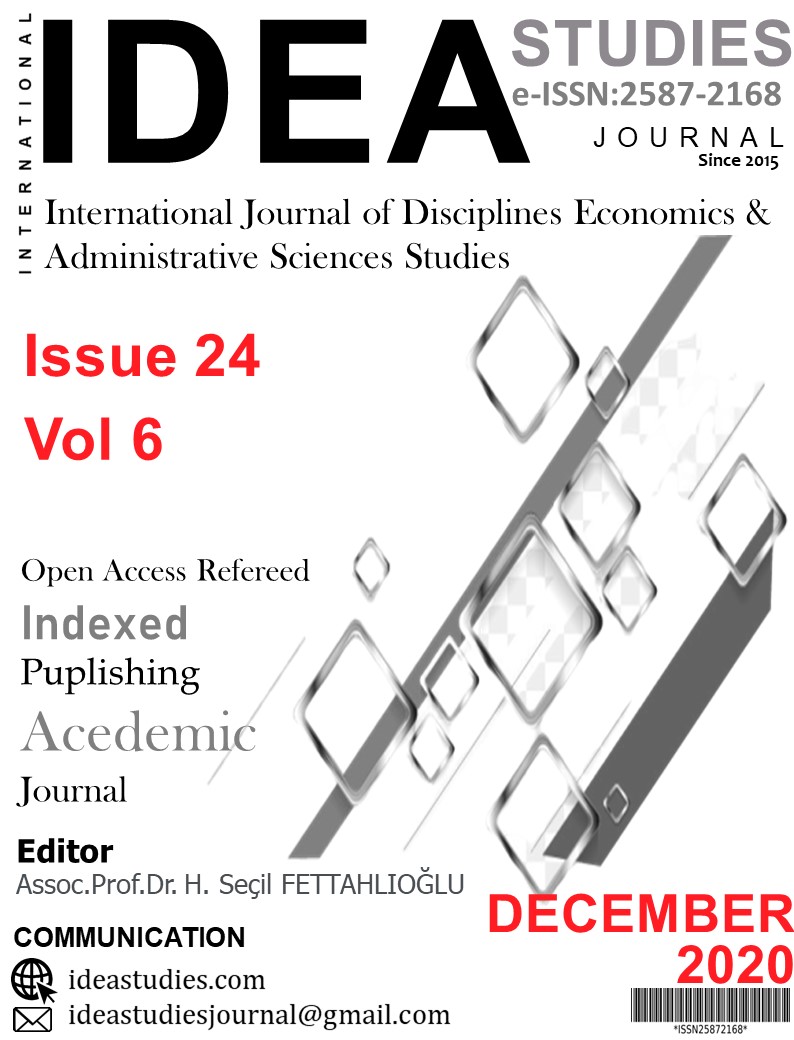Author :
Abstract
Kurum kültürü, bir firmanın kendine özgü özelliklerini ortaya çıkaran ve organizasyonunu, işlevini, davranışını ve kurallarını tanımlayarak onu diğer şirketlerden ayıran çok önemli bir faktördür. Çalışanlarının eğitim düzeyi, kurum kültürünü doğrudan veya dolaylı olarak etkiler ve şekillendirir. Hazır giyim sektörü, Türkiye'deki en önemli sektörlerden biridir. Bu sektör hem istihdamda hem de süreklilikte kilit rol oynarken, şirketlerin kültürel gelişimi büyüme, süreklilik ve markalaşma ile ilgili faaliyetlerle çalışanların şirket sadakati konusundaki görüşlerini doğrudan etkilemektedir. Bu araştırmada, Türkiye'de faaliyet gösteren hazır giyim sektörü yöneticilerinin kurum kültürüne etkisini incelemek amaçlanmıştır. Bu amaca doğrultusunda İstanbul'da 15 hazır giyim firması ile görüşüldü. Bu firmalarda 373 yönetici pozisyonunda çalışandan ait veriler toplanmıştır. Yüz yüze anket tekniği ile elde edilen veriler SPSS 22.0 programı ile analiz edilmiştir. Araştırmada kullanılan anket iki bölümden oluşmaktadır. Birinci bölümde demografik bilgiler yer almaktadır. İkinci bölümde ise kurum kültürü ve eğitim ilişkisini belirlemek amacıyla oluşturulan sorular bulunmaktadır. Verilerin normal dağılıma uymadığı tespit edilmiştir. Bu nedenle, istatistik analizlerde Mann Whitney U-Test ve Kruskal Wallis H-Test teknikleri kullanılmıştır. Araştırmadan elde edilen sonuçlara göre bu firmalarda çalışanların çoğu hala ön lisans ve lise mezunlarıdır. Buralarda lisans ve lisansüstü eğitimli yöneticilerin iş başına getirilmesi kaçınılmaz olarak görülmektedir. Araştırmanın başka bir sonucu, eğitim düzeyinin yöneticiler arası iletişimi etkilemediği ancak kurumsallaşma açısından değerlendirildiğinde yetersiz olduğudur.
Keywords
Abstract
Corporate culture is a very important factor that reveals the unique characteristics of a firm and distinguishes it from other companies by defining its organization, function, behavior and rules. The education level of its employees directly or indirectly affects and shapes the corporate culture. Apparel industry is one of the most important sectors in Turkey. While this sector plays a key role in both employment and continuity, the cultural development of companies directly affects employees' views on company loyalty through activities related to growth, continuity and branding. In this research, the garment industry executives operating in Turkey aimed to investigate the effect of corporate culture. For this purpose, 15 garment companies were contacted in Istanbul. Data were collected from 373 employees in managerial positions in these companies. The data obtained by face to face survey technique were analyzed with SPSS 22.0 program. The questionnaire used in the study consists of two parts. The first section includes demographic information. In the second part, there are questions created to determine the relationship between corporate culture and education. It was determined that the data did not conform to the normal distribution. Therefore, Mann Whitney U-Test and Kruskal Wallis H-Test techniques were used in statistical analysis. According to the results obtained from the research, most of the employees working in these companies are still associate degree and high school graduates. It is inevitable that undergraduate and graduate educated managers are brought to work here. Another result of the study is that the level of education does not affect the communication between managers, but is insufficient when evaluated in terms of institutionalization.
Keywords
- Akıncı Vural, Z. B. (2003). Kurum kültürü ve örgütsel iletişim. İstanbul: İletişim Yayınları.
- Akıncı Vural, Z. B. (2003). Kurum kültürü ve örgütsel iletişim. İstanbul: İletişim Yayınları.
- Alpar, R. (2010). Spor, sağlık ve eğitim bilimlerinden örneklerle uygulamalı istatistik ve geçerlik-güvenirlik: Detay Yayıncılık.
- Barutçugil, İ. (2011). Kültürler arası farklılıkların yönetimi: Kariyer. Bingöl, D. (2010). İnsan kaynakları yönetimi: Beta Yayıncılık.
- Börü, D. (2007). İletişim ve kültür. Kültürel Bağlamda Yönetsel-Örgütsel Davranış. İçinde: Erdem R. ve Çukur CŞ (ed.) ss, 427-459.
- Coomer, K. (2007). Corporate cultures. Occupational Health & Wellbeing, 59(4), 28.
- Çakar, N. D., Yıldız, S., & Dur, S. (2010). The relationship between knowledge management andorganizational effectiveness: The effects of organizational culture and structure. Ege Akademik Bakış Dergisi, 10(1), 71-93.
- Downey, S. M. (1986). The relationship between corporate culture and corporate identity. Public Relations Quarterly, 31(4), 7-12.
- Ertuğrul, A. N. (2013). İç Kontrol ile Kurum Kültürü ilişkisi ve Anadolu Üniversitesi Araştırması Muhasebe ve Vergi Uygulamalari Dergisi (MUVU)/Journal of Accounting & Taxation Studies (JATS), 6(1).
- Harun, K. (2008). Kamu ve özel sektör kuruluşlarının örgütsel kültürünün analizi ve kurum kültürünün çalışanların örgütsel bağlılığına etkisi: Görgül bir araştırma. Maliye Dergisi(155).
- Hofstede, G. (1980). Motivation, leadership, and organization: do American theories apply abroad? Organizational dynamics, 9(1), 42-63.
- Koçel, T. (2001). İşletme yöneticiliği, yönetim ve organizasyon, organizasyonlarda davranış klasik-modern- çağdaş ve güncel yaklaşımlar. 8. İstanbul: Beta.
- Lim, B. (1995). Examining the organizational culture and organizational performance link. Leadership & Organization Development Journal, 16(5), 16-21.
- Morrison, J. M., Smit, E., & Brown, C. (2006). A supportive organisational culture for project managementin matrix organizations: a theoretical perspective. South African Journal of Business Management, 37(4), 39- Okay, A. (2002). Kurum kimliği ve kurum imajı. Her yönüyle pazarlama iletişimi.
- Pfister, J., & Hartmann, F. (2011). Managing organizational culture for effective internal control: From practice to theory. The Accounting Review, 86(2), 738-741.
- Richard, F. T. (2005). Corporate Culture Defines A Company And İts Future. Mid-American Journal Of Business, 20(2).
- Ritchie, J., & Thompson, P. (1988). Organization and people: readings, exercises, and cases, in organizational behavior: West Group.
- Root, S. J. (1998). Beyond COSO: internal control to enhance corporate governance: Wiley.Schein, E. H. (2006). Organizational culture and leadership (Vol. 356). Hoboken: Wiley.
- Sørnes, J.-O., Stephens, K. K., Sætre, A. S., & Browning, L. D. (2004). The reflexivity between ICTs andbusiness culture: Applying Hofstede’s theory to compare Norway and the United States. Informing Science Journal, 7(1), 1-30.
- Şişli, G., & Sevinç, K. (2013). Kurum Kültürü ve Kurumsal İmaj İlişkisi: Devlet ve Vakıf Üniversiteleri Üzerine Bir Uygulama Erciyes Üniversitesi İktisadi ve İdari Bilimler Fakültesi Dergisi(41), 165-193.
- Tüm, K., & Reyhanoğlu, M. (2015). İç Kontrol Sisteminin Örgüt Kültürünü Belirlemesindeki Rolü. Mustafa Kemal Üniversitesi Sosyal Bilimler Enstitüsü Dergisi, 12(31), 395-422.
- Uzoğlu, S. (2001). Kurumsal kimlik, kurumsal kültür ve kurumsal imaj.





